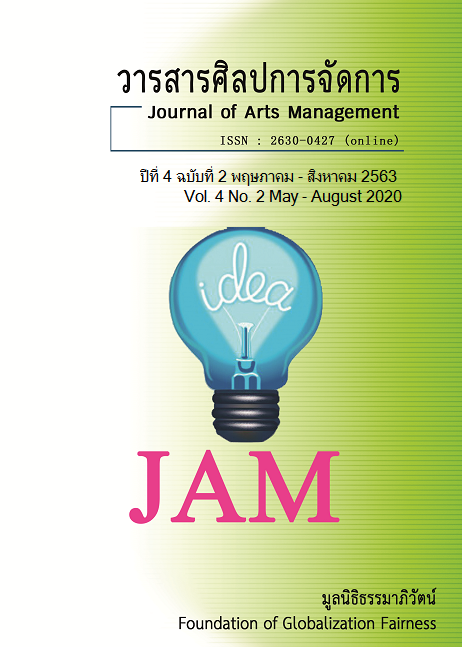Acceptance and Attitudes towards the Cashless Society of Consumers in Bangkok
Main Article Content
Abstract
The purposes of this research was to study the acceptance the attitudes towards and compare the personal factors related to the acceptance of the cashless society. The population in this study lives in Bangkok consisting of 400 samples. Questionnaires were used to collect data. Statistics used to analyze the data were Frequency, Percentage, Average Mean, Standard Deviation, t-test, One-Way ANOVA.
The study indicated that Acceptance factors for access to cashless societies consist of five aspects; namely, expectations for use, facilities in use, social influence, and acceptance of the modern technology. The attitude toward cashless society consists of 3 aspects; understanding, feelings, and the behavior, which showed a very high level in all aspects. Considering the acceptance of cashless access among the people in Bangkok, it found that the differences in careers and income differently showed their attitudes towards cashless society at a significant level (.05).
Article Details
Views and opinions appearing in articles in the Journal of Arts of Management It is the responsibility of the author of the article. and does not constitute the view and responsibility of the editorial team I agree that the article is copyright of the Arts and Management Journal.
References
กุลธิดา เล้าเจริญและจิตพนธ์ ชุมเกต (2560). ได้ศึกษาเรื่องรูปแบบความสำเร็จในการดำเนินธุรกิจบริการด้านการเดินทางด้วยการประยุกต์นวัตกรรมด้านเทคโนโลยีสารสนเทศ. การประชุมวิชาการระดับชาติ สังคมศาสตร์วิชาการครั้งที่ 14 มหาวิทยาลัยราชภัฏเชียงราย.
จิญาดา แก้วแทน (2557). ปัจจัยที่มีผลต่อการยอมรับการใช้บริการชำระเงินทางอิเล็กทรอนิกส์ผ่านอุปกรณ์สมาร์ทโฟน กรณีศึกษาในเขตพื้นที่กรุงเทพมหานครและจังหวัดปทุมธานี.ปริญญาบริหารธุรกิจมหาบัณฑิต วิชาเอกการบัญชี: มหาวิทยาลัยเทคโนโลยีราชมงคลธัญบุรี.
ชลิตพันธ์ บุญมีสุวรรณ. (2561). สังคมไร้เงินสด, วารสารธุรกิจปริทัศน์, 10(2), 235-248.
วิไลวรรณ ทองประยูรและคณะ (2560).การรับรู้ประโยชน์บริการพร้อมเพย์ของบุคคลทำงานในกรุงเทพมหานคร.วารสารเศรษฐศาสตร์และบริหารธุรกิจปริทัศน์, 13(1).
นนทกร เทิดทูลทวีเดช. (2559). Cashless Society: เตรียมพร้อมเข้าสู่สังคมไร้เงินสดอย่างเต็มรูปแบบ.
นิตยสารการเงินธนาคาร ฉบับเดือนสิงหาคม 2559. สืบค้นเมื่อ 1 สิงหาคม 2560. จาก
https://www.scbeic.com/th /detail/product/2602
สุริพงษ์ ตันติยานนท์. (2560). ซื้อออนไลน์ แต่จ่ายเงินสด รั้งไทยเข้าสู่ยุค Cashless Society. สืบค้นเมื่อ
สิงหาคม 2560. จาก https://www.brandbuffet.in.th/2017/06/visa-cashless-societypayment/
Klonglan, G.E., & Coward, E.W., Jr. (1970). The Concept of Symbolic Adoption: A Suggested
Interpretation. Rural Society. 35(1), 77-83.
McGuire, W. J. (1985). "Feeling and Knowing, Attitude and Attitude Change". In G. Lindzey & Elliot Aronson (Eds.), The Handbook of Social Psychology (3rd ed.), 2, 233-246, Reading: Addison -Wesley Publishing Company.
Bonsón Ponte, E., Carvajal-Trujillo, E., & Escobar-Rodríguez, T. (2015). Influence of trust and per-ceived value on the intention to purchase travel online: Integrating the effects of assurance on trust antecedents. Tourism Management, Elsevier, 47(C), 286-302.
Rogers, E. M., & Shoemaker, F. F. (1971). Communication of Innovations: A Cross Cultural Approach.
New York: The Free Press.


